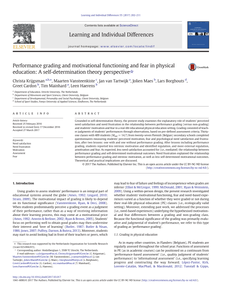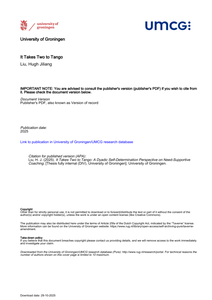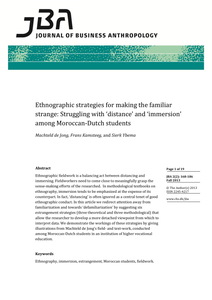World globalisation drives companies to undertake international expansion with the aim of retaining or growing their businesses. When companies globalize, managers encounter new challenges in making international marketing strategy (IMS) decisions, which are influenced by perceived cultural and business distance between their home- and foreign country. Telkom Indonesia International (Telin) was formed by Telkom Indonesia (i.e. the state-owned company in the telecommunication industry in Indonesia) to engage in international business within a global market. The central question in this study is to what extent do managers’ perceived cultural and business distance between home- and foreign country influence their IMS decisions? A mixed research strategy will be employed by applying qualitative and quantitative methods concurrently. The data collection will involve interviews with CEOs and managers, alongside a web survey to 55 managers of Telkom's. Results suggest important consequences for IMS decisions and emphasizes the need for dialogue on perceptions of cultural and business characteristics of countries.
DOCUMENT

Grounded in self-determination theory, the present study examines the explanatory role of students' perceived need satisfaction and need frustration in the relationship between performance grading (versus non-grading) and students' motivation and fear in a real-life educational physical education setting. Grading consisted of teacher judgments of students' performances through observations, based on pre-defined assessment criteria. Thirty-one classes with 409 students (Mage = 14.7) from twenty-seven Flemish (Belgian) secondary schools completed questionnaires measuring students' perceived motivation, fear and psychological need satisfaction and frustration, after two lessons: one with and one without performance grading. After lessons including performance grading, students reported less intrinsic motivation and identified regulation, and more external regulation, amotivation and fear. As expected, less need satisfaction accounted for (i.e., mediated) the relationship between performance grading and self-determined motivational outcomes. Need frustration explained the relationship between performance grading and intrinsic motivation, as well as less self-determined motivational outcomes. Theoretical and practical implications are discussed.
DOCUMENT

When reconstructing a shooting incident with a shotgun, the muzzle-to-target distance can be determined by relating the size of a dispersion pattern found on a crime scene to that of test shots. Ideally, the test shots are performed with the weapon and ammunition that were used in the incident. But sometimes examiners will have to resort to alternatives, such as using cartridges of the same brand and type but with another pellet size. For this reason, the relationship between pellet size and shotgun dispersion patterns was studied with both lead and steel shotgun pellets. Cartridges were loaded with identical cartridge cases, powder charges, and wads but with different pellet sizes, below size B. The cartridges were fired, and the dispersion patterns at 5 m in front of the muzzle were measured and compared. The results provide strong support for the proposition that shotgun dispersion patterns with both lead and steel shot increase with decreasing pellet size if all other relevant parameters are kept equal. The results also provide an indicative measure of the magnitude of the effect. Pattern sizes were approximately 1.7 times larger with #9 than with #0 lead shot and 1.4 times larger with #9 than with #1 steel shot. The differences between consecutive shot sizes were generally smaller. This means that cartridges of equal brand and type but with the next nearest shot number can be used for a muzzle-to-target distance determination, keeping the information of the current study in mind in the final interpretation of the results.
DOCUMENT
Acknowledging the knowledge gaps and novel paradigms outlined above within both coaching research and practice, the PhD research aims to investigate how need-supportive coaching—rooted in Self-Determination Theory (SDT)—effectively fulfils the satisfaction of beginning teachers’ basic psychological needs (BPNs) and autonomous motivation in pursuing their coaching goals within dyadic coaching relationships. To systematically explore this overarching objective, this PhD project and thesis adopt a structured, four-step approach, where each step investigates specific and complementary aspects of the coaching process. Collectively, these steps provide a comprehensive examination of how and under what conditions BPN-supportive coaching facilitates optimal motivational outcomes, enriching our understanding of the dynamic processes that shape coaching effectiveness among beginning teachers. Specifically, four research questions systematically guide the four research steps:1. What is the current state of empirical evidence linking BPN support, BPN satisfaction, and autonomous motivation within coach-coachee relationships?2. How do perceptual distances between coaches’ and coachees’ perceptions regarding BPN support relate to the coachees’ BPN satisfaction?3. How do coaches’ and coachees’ BPN satisfaction mutually predict autonomous motivation toward shared goals in their dyadic relationships?4. How do coaches and coachees dynamically co-regulate BPN interactions in real-time dyadic coaching conversations?Chapter 1 outlined a four-step empirical approach across Chapters 2 to 5 to understand BPN-supportive coaching. Chapter 2 meta-analysed the extant literature guided by a circular framework connecting BPN support, BPN satisfaction, and autonomous motivation for both parties. The results revealed that previous studies predominantly used individual-level data, neglecting the dynamic, reciprocal interactions in coaching. Chapter 3 investigated perceptual distance between coaches and coachees regarding BPN support using polynomial regression and response surface analysis. Results indicated that coachees reported greater BPN satisfaction when perceptions were closely aligned. Chapter 4 adopted the Actor-Partner Interdependence Model to examine how both parties’ BPN satisfaction is associated with their own and each other’s autonomous motivation. We found a positive unidirectional association between coachees’ relatedness satisfaction and coaches’ autonomous motivation and bidirectional associations for autonomy satisfaction. Chapter 5 employed State Space Grid analyses to capture the moment-to-moment co-regulation of autonomy in coach-coachee dyads. Results revealed recurrent patterns of predominant functional co-regulation (e.g., autonomy support met with proactive autonomy expression), and occasional dysfunctional co-regulation (e.g., evaluative feedback met with disengagement). Temporal evolvement in autonomy co-regulation was identified across coaching sessions in response to changing goals. Chapter 6 synthesised the contributions of the thesis. Collectively, BPN-supportive coaching can be viewed as a context-sensitive, interdependent, co-regulatory, and dynamic process, and we provided guidance for adaptive and relationally grounded coaching practices.
DOCUMENT

PURPOSE: Walking ability in general and specifically for lower limb amputees is of major importance for social mobility and ADL independence. Walking determines prosthesis prescription. The aim of this study was to mathematically analyse factors influencing claimed walking distance of lower limb amputees of 500 m or more.METHOD: A total of 437 patients returned two questionnaires: the Groningen Questionnaire Problems after Leg Amputation, in which walking distance was assessed, and the RAND 36.RESULTS: The chance of walking 500 m or more reduced when a transfemoral amputation was performed. The chance reduced even more when phantom pain or stump pains were present. If the amputation was performed because of vascular disease or because of vascular problems because of diabetes the chance reduced again. Independently of these factors, age reduced the chance of walking 500 m or more.CONCLUSION: The chance of walking 500 m or more reduces with increase in age and a more proximal amputation. The chance reduces even further when the amputation is performed because of diabetes or vascular disease and also if phantom pain and or stump pain is present.
DOCUMENT
This study evaluates the maximum theoretical exposure to radiofrequency (RF) electromag- netic fields (EMFs) from a Fifth-generation (5G) New Radio (NR) base station (BS) while using four commonly used mobile applications: YouTube for video streaming, WhatsApp for voice calls, Instagram for posting pictures and videos, and running a Video game. Three factors that might affect exposure, i.e., distance of the measurement positions from the BS, measurement time, and induced traffic, were examined. Exposure was assessed through both instantaneous and time-averaged extrapolated field strengths using the Maximum Power Extrapolation (MPE) method. The former was calculated for every measured SS-RSRP (Secondary Synchronization Reference Signal Received Power) power sample obtained with a sampling resolution of 1 second, whereas the latter was obtained using a 1-min moving average applied on the applications’ instantaneous extrapolated field strengths datasets. Regarding distance, two measurement positions (MPs) were selected: MP1 at 56 meters and MP2 at 170 meters. Next, considering the measurement time, all mobile application tests were initially set to run for 30 minutes at both MPs, whereas the video streaming test (YouTube) was run for an additional 150 minutes to investigate the temporal evolution of field strengths. Considering the traffic, throughput data vs. both instantaneous and time-averaged extrapolated field strengths were observed for all four mobile applications. In addition, at MP1, a 30-minute test without a User Equipment (UE) device was conducted to analyze exposure levels in the absence of induced traffic. The findings indicated that the estimated field strengths for mobile applications varied. It was observed that distance and time had a more significant impact than the volume of data traffic generated (throughput). Notably, the exposure levels in all tests were considerably lower than the public exposure thresholds set by the ICNIRP guidelines.INDEX TERMS 5G NR, C-band, human exposure assessment, mobile applications, traffic data, maximum extrapolation method, RF-EMF.
MULTIFILE

Described are the results of an investigation in the appreciation of distance learning, limited to a case study with an online lab-experiment. Together with other educational institutes and companies Fontys University of Applied Sciences participated in a number of projects in which distance learning courses were developed. Some courses have been integrated in the regular curriculum. Our study was set up to get insight into the appreciation of students for this way of learning, especially concerning online lab-experiments. By using surveys and interviews after the students accomplished either a regular course or a distance learning course on the same object we tried to get a better understanding of how students used the course and appreciated it. Also we wanted to know whether an online lab-experiment is more or less effective than a regular one. Preliminary data analyses have shown that the appreciation of an online lab-experiment is dependent on a number of items, like the educational contents of the experiment itself, the way accompanying theory is presented, possibilities of doing the experiment in an alternative way, the organization around the experiment etc. It appears also that students give serious suggestions on developing other online lab-experiments.
DOCUMENT

Ethnographic fieldwork is a balancing act between distancing and immersing. Fieldworkers need to come close to meaningfully grasp the sense-making efforts of the researched. In methodological textbooks on ethnography, immersion tends to be emphasized at the expense of its counterpart. In fact, ‘distancing’ is often ignored as a central tenet of good ethnographic conduct. In this article we redirect attention away from familiarization and towards ‘defamiliarization’ by suggesting six estrangement strategies (three theoretical and three methodological) that allow the researcher to develop a more detached viewpoint from which to interpret data. We demonstrate the workings of these strategies by giving illustrations from Machteld de Jong’s field- and text-work, conducted among Moroccan-Dutch students in an institution of higher vocational education.
DOCUMENT

Restoration of walking capacity, as reflected by walking speed and walking distance, is a primary goal after stroke. Peak aerobic capacity (peak oxygen consumption [V̇O2peak]) is suggested to be correlated with walking capacity after stroke. Although the strength of this correlation is unclear, physical therapy programs often target walking capacity by means of aerobic training. Purpose The purpose of this systematic review was to summarize the available evidence on the correlation between V̇O2peak and walking capacity. Data Sources The databases MEDLINE, CINAHL, EMBASE, Cochrane Library, and SPORTDiscus were searched up to May 2014. Study Selection Cross-sectional studies reporting correlation coefficients between V̇O2peak and walking capacity in stroke were included, along with longitudinal studies reporting these correlation coefficients at baseline. Data Extraction The methodological quality of the studies was assessed using a checklist of 27 items for observational research. Information on study design, stroke severity and recovery, and assessments and outcome of V̇O2peak and walking capacity, as well as the reported correlation coefficients, were extracted. Data Synthesis Thirteen studies involving 454 participants were included. Meta-analyses showed combined correlation coefficients (rɱ) for V̇O2peak and walking speed and for V̇O2peak and walking distance of .42 (95% credibility interval=.31, .54) and .52 (95% credibility interval=.42, .62), respectively. Limitations The studies included in the present review had small sample sizes and low methodological quality. Clinical and methodological diversity challenged the comparability of the included studies, despite statistical homogeneity. Relevant data of 3 studies could not be retrieved. Conclusions The strength of the correlation of V̇O2peak with walking speed was low and moderate for V̇O2peak and walking distance, respectively, indicating that other factors, besides V̇O2peak, determine walking capacity after stroke.
LINK
Ethnographic fieldwork is a balancing act between distancing and immersing. Fieldworkers need to come close to meaningfully grasp the sense-making efforts of the researched. In methodological textbooks on ethnography, immersion tends to be emphasized at the expense of its counterpart. In fact, ‘distancing’ is often ignored as a central tenet of good ethnographic conduct. In this article we redirect attention away from familiarization and towards ‘defamiliarization’ by suggesting six estrangement strategies (three theoretical and three methodological) that allow the researcher to develop a more detached viewpoint from which to interpret data. We demonstrate the workings of these strategies by giving illustrations from Machteld de Jong’s field- and text-work, conducted among Moroccan-Dutch students in an institution of higher vocational education.
DOCUMENT
